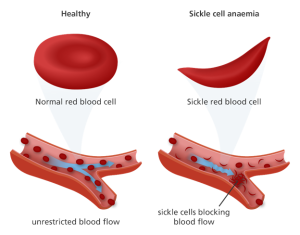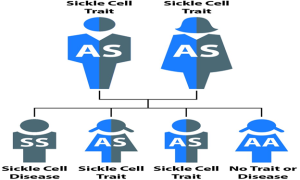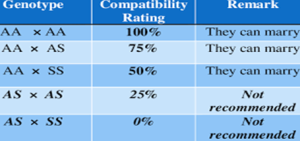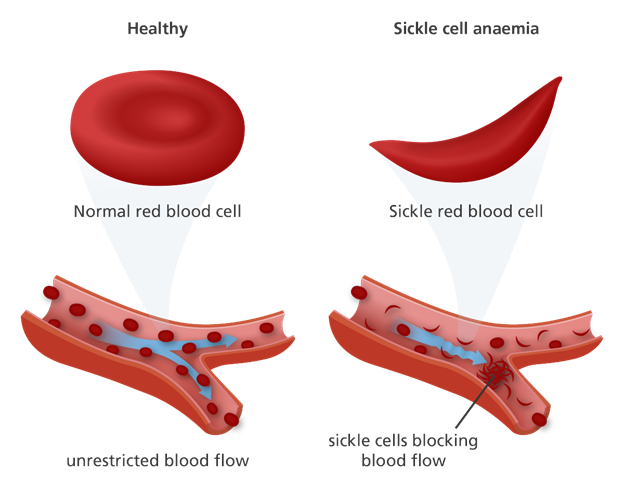Introduction
Millions of people worldwide suffer from the genetic blood disease class known as sickle cell disease (SCD). In malaria-prone regions including Africa, the Mediterranean, the Middle East, India, and the Caribbean, sickle cell disease is very common.
Source: Sickle Cell Foundation of Nigeria
The incidence of sickle cell disease (SCD) is high in Nigeria. The most populous country in Africa, Nigeria, also has the greatest rate of sickle cell disease (SCD) patients—estimates of the illness range from 4 to 6 million, affecting about one in four Nigerians.
You may personally know one or two persons who have sickle cell illness or who have chosen not to marry an AS person due to their AS status. For patients with sickle cell disease especially those still living in malaria-prone areas, the risk of complications and crisis remains high. At Wellahealth, we offer quality medical care at an affordable rate. We also offer laboratory tests and hospitalization coverage when you subscribe to any of our plans, starting at N800/month. For more enquiries send us a WhatsApp message today.
The Science of Sickle Cells
Sickle Cell Disease(SCD) is caused by a genetic mutation of the haemoglobin gene. Haemoglobin is the protein in red blood cells that is solely responsible for transporting oxygen throughout the body.
Healthy red blood cells are spherical and flexible, allowing them to readily travel blood vessels. However, in SCD, the faulty gene results in sickle-shaped red blood cells that are stiff and prone to clumping. Because of their inelasticity, they generate blockages that impede blood flow, resulting in a series of complications.

To develop sickle cell disease, both parents must carry one copy of the sickle cell gene (AS) and pass it on to their kids. SCD is inherited in an autosomal recessive pattern which means that if only one parent passes the sickle cell gene to the child, the individual will have the sickle cell trait (AS) and not sickle cell (SS).
People with the sickle cell trait (AS) generate both typical and sickle cell haemoglobin because they carry one typical haemoglobin gene and one sickle cell gene. Their blood may include sickle cells, although they rarely show symptoms. They are carriers of the disease. This means they can pass the gene down to their children.
Therefore, people with sickle cell disease inherit two copies of the sickle cell gene; each from one parent. They produce sickle cell haemoglobin and come down with sickle cell painful crisis; a complication of the disease where the blocked blood flow due to the sickle red cells causes extreme levels of pain throughout the body.
Symptoms of Sickle Cell Disease
SCD presents in various ways, as the severity varies from person to person. A few common symptoms include:
- Painful Crisis: Blockages in blood arteries can cause excruciating pain in the bones, joints, chest, and abdomen.
- Anaemia(deficiency of red cells): Normal red cells have a life span of 120 days but sickle red cells die prematurely resulting in a scarcity of healthy red blood cells, which causes weariness, weakness, and shortness of breath.
- Frequent infections and poor wound healing: Individuals with SCD are more susceptible to infections due to damage to their spleen, which is a critical organ in fighting infections. There is poor wound healing due to defective angiogenesis and deficiency in Zinc.
- Delayed Growth and Development: SCD can impair growth and development in children.
- Others include stroke, priapism, poor vision, organ damage, and failure.
Living with Sickle Cell Disease
At this moment, there is no treatment for SCD, but some strategies can assist in managing this condition and enhance an individual’s quality of life. Here are a few key approaches:
- Hydration: Drinking plenty of fluids helps to avoid dehydration, dehydration can increase symptoms as stressors can make the blood cells susceptible to sickling.
- Pain Management: Medications, heat therapy, and relaxation techniques can all assist in managing pain during a crisis.
- Smoking and alcohol cessation: It is crucial that alcohol is avoided as alcohol can cause dehydration, and smoking can induce a deadly lung illness known as acute chest syndrome (a complication of SCD).
- Folic acid supplements: Folic acid helps the body generate healthy red blood cells. So individuals with SCD should be on folic acid supplements to help minimize symptoms.
- Immunizations: Staying up to date on immunizations is critical for avoiding diseases. Additionally, making sure clean food and water supplies are consumed helps prevent infections.
- Hydroxyurea: This drug can help prevent the production of sickle cells and minimize the number of crises.
- Stress reduction and elimination: Extremes of temperatures are to be avoided in people with SCD, as this could predispose them to a crisis. They should avoid abrupt temperature changes, such as swimming in cold water. Caution should be taken at high elevations (during hiking, skydiving, or mountain climbing), as there is an increased tendency of sickle cell crisis due to decreased levels of oxygen. It is worth noting that travelling by plane should not be a concern because planes are pressurized to maintain a consistent oxygen level.
- Staying active: Exercise is crucial as this can help overall well-being, however, people living with SCD must avoid highly rigorous exercise, and vigorous activities that produce serious loss of breath are best avoided.
Moving Forward- Can Sickle Cell Disease Be Prevented?
SCD is a serious challenge for Nigeria, but not insurmountable as together we can overcome this challenge.
As Nigerians, we can enhance the future of persons living with this condition by raising awareness, offering compassion, and supporting advocacy and research efforts. Here are ways you can help those living with SCD:
- Be Informed: Knowledge is power, know your genotype and those of your family members. Advise them accordingly on the need to choose their partners with love and according to their genotypes.
- Compassion: Provide a listening ear and understanding to individuals in pain or tiredness due to the condition or other health challenges.
- Support: Consider donating to organizations that promote SCD research, treatment, and patient care. Support advocacy efforts by donating or volunteering with organizations trying to raise SCD awareness and improve care. Such organizations in Nigeria include Sickle Cell Foundation Nigeria
Before you go, please take a quick look at the chart below:

Conclusion
As Nigerians, education about health conditions like sickle cell disease remains crucial in understanding and managing the disease. Let us work together in building a future where sickle cell disease no longer impacts the lives of millions of Nigerians and their families.
Dr. Ifeoma Uduh, Dr. John Afam






